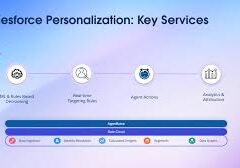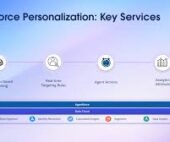Salesforce’s Agentforce empowers businesses to create and deploy custom AI agents tailored to their unique needs. Built on a foundation of flexibility, the platform leverages both Salesforce’s proprietary AI models and third-party models like those from OpenAI, Anthropic, Amazon, and Google. This versatility enables businesses to automate a wide range of tasks, from generating detailed sales reports to summarizing Slack conversations.
AI in Action: Real-World Insights and Applications
The “CXO AI Playbook” by Business Insider explores how organizations across industries and sizes are adopting AI. Featured companies reveal their challenges, the decision-makers driving AI initiatives, and their strategic goals for the future. Salesforce’s approach with Agentforce aligns with this vision, offering advanced tools to address dynamic business needs and improve operational efficiency.
Building on Salesforce’s Legacy of Innovation
Salesforce has long been a leader in AI integration. It introduced Einstein in 2016 to handle scripted tasks like predictive analytics. As AI capabilities evolved, Salesforce launched Einstein GPT and later Einstein Copilot, which expanded into decision-making and natural language processing. By early 2024, these advancements culminated in Agentforce—a platform designed to provide customizable, prebuilt AI agents for diverse applications.
“We recognized that our customers wanted to extend our AI capabilities or create their own custom agents,” said Tyler Carlson, Salesforce’s VP of Business Development.
A Powerful Ecosystem: Agentforce’s Core Features
Agentforce is powered by the Atlas Reasoning Engine, Salesforce’s proprietary technology that employs ReAct prompting to enable AI agents to break down problems, refine their responses, and deliver more accurate outcomes. The engine integrates seamlessly with Salesforce’s own large language models (LLMs) and external models, ensuring adaptability and precision.
Agentforce also emphasizes strict data privacy and security. For example, data shared with external LLMs is subject to limited retention policies and content filtering to ensure compliance and safety.
Key Applications and Use Cases
Businesses can leverage tools like Agentbuilder to design and scale AI agents with specific functionalities, such as:
- Automated Task Management: Sorting emails and routing them to appropriate departments based on intent.
- Knowledge Retrieval: Using retrieval-augmented generation (RAG) to access internal documents and answer complex, organization-specific questions.
- Employee Support: Collaborating with companies like Workday, Salesforce has developed AI-powered HR agents that provide personalized responses based on private company policies.
Seamless Integration with Slack
Currently in beta, Agentforce’s Slack integration brings AI automation directly to the workplace. This allows employee-facing agents to execute tasks and answer queries within the communication tool. “Slack is valuable for employee-facing agents because it makes their capabilities easily accessible,” Carlson explained.
Measurable Impact: Driving Success with Agentforce
Salesforce measures the success of Agentforce by tracking client outcomes. Early adopters report significant results, such as a 90% resolution rate for customer inquiries managed by AI agents. As adoption grows, Salesforce envisions a robust ecosystem of partners, AI skills, and agent capabilities.
“By next year, we foresee thousands of agent skills and topics available to clients, driving broader adoption across our CRM systems and Slack,” Carlson shared.
Salesforce’s Agentforce represents the next generation of intelligent business automation, combining advanced AI with seamless integrations to deliver meaningful, measurable outcomes at scale.
🔔🔔 Follow us on LinkedIn 🔔🔔












